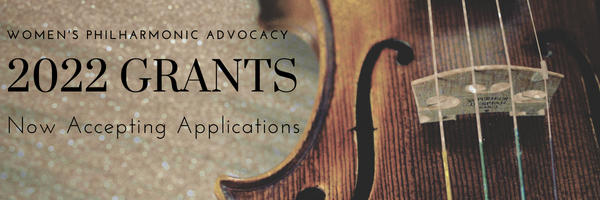The core mission of Women’s Philharmonic Advocacy has always been to advocate for, support, and celebrate the works of women composers being performed and recorded in contemporary orchestras. It is not enough to know of these composers or their music – they deserve to be heard.
Our Performance Grants were first developed to support individual performances of works by women composers, and specifically to cover the incidental expenses that are related to performing little known or new works. This included purchasing or renting music, hiring additional performers, creating dynamic outreach events, as well as other small costs that go along with any performance. In taking a pause from the Grant Programs during the early days of the Covid Pandemic, the WPA Board of Directors was able to take time and thoughtfully consider the current state of classical music performance – particularly in response the impact of the Black Lives Matter and #MeToo movements. Though our previous grant program had a wide and exciting impact, the Board of Directors voted to revise the program, extending reach beyond individual concerts to encourage and support ensembles who are making thoughtful, systemic changes to their programming.
The WPA Grant Program in its revised form now seeks to support ensembles over a multi-year period and provide more significant funding to help shape ensembles, and their performances, to be truly representative of the diversity of Western Art Music, actively leaning toward the future in terms of education, outreach, and wider engagement. We seek to support and engage with Community, Youth, and Professional ensembles, make the performances of historic and contemporary women composers a regular addition to concert programming, and help create educational outreach opportunities that will change the face of classical music by directly inviting whole communities to participate in events, dismantling the idea that this music only belongs to individuals from a particular race, age, or social class.
We at WPA are excited for the opportunity to build longstanding relationships with ensembles nationwide, and to enhance the work that is already being taken on to make classical music more accessible to and representative of the wider public. Learn more at our Grants Overview page.

